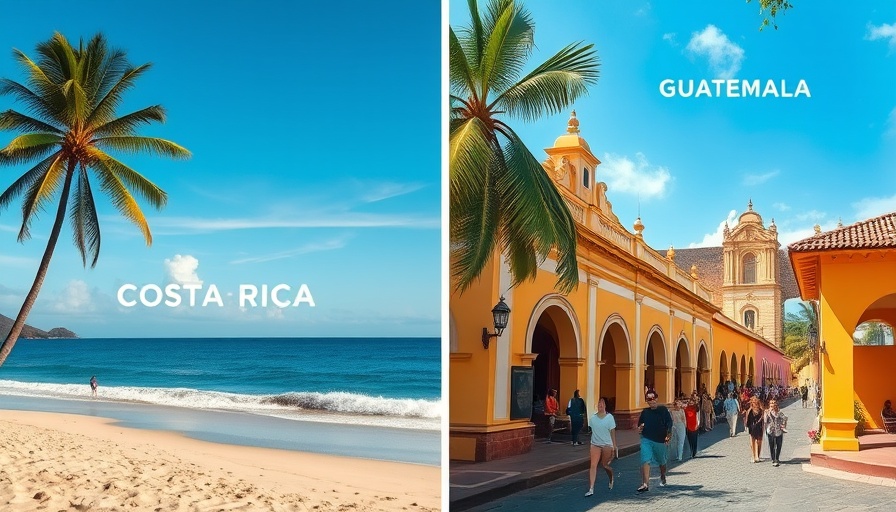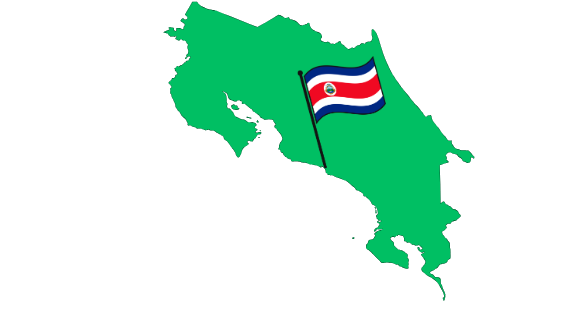
Understanding the Allure of Central America: Costa Rica vs. Guatemala
The debate over the best Central American destination often hinges on two countries: Costa Rica and Guatemala. Both are rich in culture, nature, and history but offer distinct lifestyles. From cuisine to healthcare and the natural environment, this comparative analysis aims to shed light on the unique aspects of each country, helping anyone considering relocation to make an informed choice.
The video 'Moving to Costa Rica vs: Guatemala' presents an intriguing comparison of these two vibrant Central American countries, prompting a deeper analysis to guide potential travelers and expats.
Natural Beauty: A Landscape of Diversity
Both Costa Rica and Guatemala boast stunning natural landscapes, but they do so in different ways. Costa Rica is renowned for its biodiversity, hosting 6% of the world’s flora and fauna within its borders. It offers a variety of ecosystems, including rainforests, cloud forests, and beautiful coastlines on both the Atlantic and Pacific sides.
Guatemala, meanwhile, is characterized by dramatic elevations that shape its climate and ecology. The country features numerous lakes, including the picturesque Lake Atitlán, surrounded by volcanoes that contribute to its breathtaking scenery. Moreover, Guatemala's rich indigenous heritage infuses the landscape with history, culminating in the ruins of ancient Mayan civilizations, which stand as a testament to its dynamic culture.
Healthcare Accessibility: A Critical Consideration
Healthcare quality is a significant factor when comparing Costa Rica and Guatemala. Costa Rica is known for its robust healthcare system, offering universal healthcare that meets high standards. It has become a hub for medical tourism, attracting individuals from other countries seeking affordable healthcare services.
On the other hand, Guatemala presents challenges in this realm. Although there is private healthcare available, it falls short in quality and availability compared to Costa Rica. For many potential expats or retirees, access to reliable healthcare is a dealbreaker; Costa Rica’s established system often shines brighter in this respect.
Cultural Flavor: Food and Heritage
When it comes to food, Guatemala offers an exciting array of flavors influenced by its rich mix of indigenous and Spanish traditions. The country's markets brim with fresh ingredients that lead to dishes bursting with flavor and a variety of spices rarely found in Costa Rican cuisine. While Costa Rica’s culinary scene focuses on simplicity and freshness—delivering a refined taste in popular dishes like Gallo Pinto—it lacks the complexity of Guatemalan dishes.
Cultural experiences in both countries offer depth, but Guatemala’s intricate tapestry of Mayan influence is particularly compelling. The lively festivals, traditional clothing, and indigenous languages bring vibrancy to daily life that sets it apart.
Cost of Living: A Practical Comparison
Affordability can significantly affect one’s decision on relocation. Generally speaking, the cost of living is lower in Guatemala compared to Costa Rica. Rent, food, and consumer goods tend to be more economical, tempting many expatriates to consider a move. However, it's essential to evaluate the trade-offs of cost against accessibility, as some areas in Guatemala may lack modern conveniences.
In cities like Antigua, while the allure of colonial architecture attracts expats, property prices can be surprisingly high, making the comparison nuanced. Therefore, potential residents should take careful steps to understand regional variations in cost to ensure they find a place within their budget.
Safety and Stability: An Ongoing Concern
Safety is often a paramount concern for anyone considering a move abroad. Costa Rica is generally regarded as a safer option, having established a stable democracy and lower crime rates. In contrast, Guatemala has a more complicated political history marked by civil strife and corruption. Although there are areas in Guatemala that are safe and welcoming, crime rates remain a concern in larger cities, necessitating caution and awareness when navigating daily activities.
Nonetheless, the experience can vary significantly depending on the location within Guatemala. Many expats report feeling safe in tourist-friendly areas, while urban centers may present more challenges.
Conclusion: Finding Your Ideal Fit
Ultimately, the decision between moving to Costa Rica or Guatemala depends on personal priorities. Some may gravitate towards Costa Rica’s safety, healthcare, and environmental focus, while others may be enchanted by Guatemala’s rich culture, lower costs, and stunning landscapes. The essence of living abroad lies in understanding your own preferences and what you cherish most in a community.
Whether you are drawn to the beaches of Costa Rica or the lakes of Guatemala, conducting thorough research is vital. Engaging with locals and expats through forums, social media, or even on-the-ground visits can yield invaluable insights that enhance your decision-making process.
If you're contemplating a move to Central America, take your time to explore the unique experiences both countries offer, as finding your place in the world is a journey worth embarking on.
 Add Row
Add Row  Add
Add 




 Add Row
Add Row  Add
Add 

Write A Comment